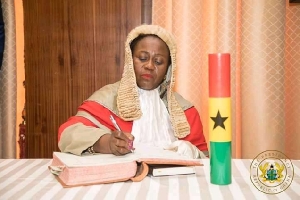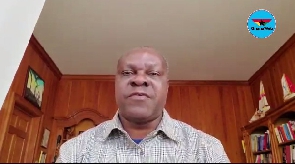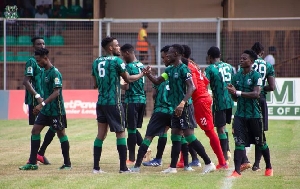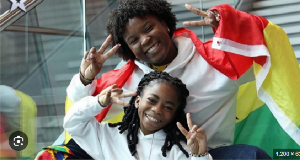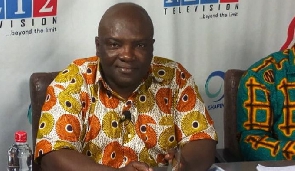Opinions of Monday, 20 May 2024
Columnist: Francisca Serwaa Boateng
Francisca Serwaa Boateng writes: Beyond impunity
A: Introduction & background facts
“[I]f we were so unfortunate as to get for our Chief Justice a cynical, mischievous and obstinate individual who also had the ear of the President, at least, a sizeable section of the Judiciary could be subjected to mayhem, with a not too remote consequence of bedlam.”[1]
In the past one week, a lot has happened on the law front. Two of the most well-known cases in this Republic came on for hearing in the Supreme Court. The cases concerned first, were the LGBTQI cases seeking to abort the signing of the Proper Human Sexual Rights & Ghanaian Family Values Bill into law and second, an appeal in the matter of criminal proceedings against one Dr. Stephen Opuni. Thanks to the power of the media – both traditional and social – the entire country was feted to the full details of what transpired in the hallowed sanctum of the Supreme Court in both cases.
The hearing in the LGBTQI cases was beamed live on television. The Attorney-General reportedly requested the live TV transmission of the proceedings and it was granted by the Chief Justice who chaired the panel. It is unclear what input, if any, was solicited from or made by the other parties in the cases before cameras were zoomed into their faces in open court. Be that as it may, it is the entire citizenry’s expectation that when the actors make time to review their performances on live TV, they will be fully satisfied with what they see.
In the matter of the Opuni proceedings, there were no TV cameras present but the after-court-session reports in the media made startling reading. It will be recalled that when Honyenuga, JSC retired from the Supreme Court bench at 70 years + 6 months, the criminal proceedings he was handling as an additional High Court judge in Republic v Stephen Kwabena Opuni, Seidu Agongo and Agricult Ltd was put before a High Court judge, Anokye Gyimah, J. The new judge ruled that he would hold a fresh hearing. The Attorney-General appealed against the ruling. The Court of Appeal overturned the ruling and ordered the judge to adopt the proceedings held before Honyenuga, JSC and continue from where the latter left. Before Anokye Gyimah, J could do as he had been ordered by the Court of Appeal, he was given a meteoric transfer to Kumasi.
In the meantime, the accused persons appealed against the Court of Appeal’s decision to the Supreme Court. It is reported that the appeal was previously placed before a duly constituted 5-member panel.[2] The appellant and respondent appeared before the panel in January, 2024. They were ordered to file their respective statements of case, which they did. Their appearance in court this week – 8th May, 2024 - was for the panel to give judgment.
To the utter shock of the accused/appellant and others present, when the case was called, a differently-constituted panel of 5[3] – now chaired by the Chief Justice – came to sit. Later events show that the prosecutor/respondent, the Attorney-General, did not share the appellant’s shock. The appellant immediately raised a legal objection to the changed composition of the panel, citing article 157 (3) of the Constitution, 1992.[4] The said article states that when a judge of a Superior Court (that is, Supreme Court, Court of Appeal and High Court) is handling a case and the parties have made their legal arguments but judgment has not yet been given, the judge cannot withdraw from the case.
The Chief Justice overruled the appellant’s objection, stating that the case was not ready for hearing when the Mariama Owusu, JSC panel instructed the parties to file their statements of case. According to reports, the Chief Justice indicated that the proceedings so far held in the appeal did not constitute a ‘hearing’ and as such, she was right in changing the panel since there had been no hearing and no judgment given in the appeal.
As soon as the happenings in court came into the public domain, reactions were swift and mostly negative, Chief Justice-wise. Whether by design or by fatigue, the perennial protectors of judicial officers and the Judiciary – Ghana Bar Association – has gone into hiding. His Lordship, Mr. Justice Kulendi who, in normal times, would have stepped up to the plate to entreat citizens to mind their language is himself caught in the eye of the storm. He is part of the ‘triple K’ squad who have been jettisoned from the case. Naturally, the appetite for PR duties will be lost on any one under such circumstances. Considering the reported “Always let me land” exchanges that occurred recently in the LGBTQI trial in the Supreme Court, one wonders whether Sory @ Law will lend itself to a retainer In re: Judiciary Public Relations Affairs.
So, with Ghana Bar Association and Company effectively withdrawing their ‘mouth-piece’ services, the lot fell on the indefatigable Attorney-General - the prosecutor/respondent in the pending appeal – to issue a press release[5] in defence of the Chief Justice (President of the panel). What the Attorney-General wanted all ye men present to know was that, the Chief Justice is, by law, a member of every court in Ghana. The Chief Justice is also, by law, the person who empanels courts and changes panels. Therefore, by simple logical deduction, the Chief Justice can replace any judge sitting in any court in Ghana at any time during proceedings in any court on any subject matter and involving any parties and without notice to the party who initiated the proceedings and finally, install herself as the judge.
Oblige me, but this public relations role played by the Attorney-General – apart from the fact that the reasoning in his statement is misconceived in law - is symptomatic of what Mr. Justice Gabriel Pwamang aptly described in a recent case as “symbiotic posturing.”[6] At any rate, is the Attorney-General’s own position as an interested party in the appeal congruent with his role as the ‘public relations officer’ of the Chief Justice, the president of the panel? Your guess is as good as mine.
Now, to the pith and marrow of the discourse: Was the Chief Justice justified in overruling the appellant’s legal objection to the new composition of the panel after the parties had filed their statements of case as ordered by the original panel? Are the views expressed by the Attorney-General right? For answers to these queries, kindly come along.
B: When is the Supreme Court seised of a criminal appeal?
In civil appeals,[7] the Supreme Court assumes jurisdiction to control the appeal proceedings after the Registrar of the Court of Appeal has transmitted the record of appeal to the Supreme Court. Thus, the Supreme Court has jurisdiction over an appeal only after Form 6 has been issued and served on the parties notifying them that the record has been transmitted to the Supreme Court. This position has been affirmed in cases such as Republic v High Court, (Human Rights Division), Accra, ex parte Akita, (Mancell-Egala & Attorney-General Interested Parties),[8] Republic v High Court; ex parte Evangelical Presbyterian Church of Ghana,[9] and Shardey v Adamtey; Shardey v Martey (Consolidated).[10]
Unlike civil appeals, the Supreme Court Rules[11] contain no elaborate procedure for determining when the Supreme Court is said to be seised of a criminal appeal. Criminal appeals have very simple rules because they usually involve the rights of individuals and are handled, or ought to be handled, expeditiously. The rules simply provide that when an appellant files a notice of a criminal appeal or the appellant is granted leave to appeal by the Court of Appeal, the Court of Appeal Registrar must forward the following documents to the Supreme Court Registrar:
(a) The notice of the criminal appeal or the notice of an application for leave to appeal with the order of the Court of Appeal granting leave to appeal; and
(b) Nine (9) copies of the proceedings in the Court of Appeal.
(c) The original exhibits in the case and any other documents that form part of the record.[12]
In the Opuni case, once the notice of the criminal appeal or the notice of an application for leave to appeal with the order of the Court of Appeal granting leave to appeal, as well as the original exhibits were forwarded to the Supreme Court, the appeal was ripe for hearing. That explains why the Mariama Owusu, JSC panel held court in January, 2024, ordered the parties to file their statements of case within certain fixed time periods and gave 8th May, 2024 as the date for judgment. In the light of these basic legal principles, legal ingenuity will be sorely taxed to propound a theory to support the Chief Justice’s assertion that the appeal was not ripe for hearing when the Mariama Owusu, JSC panel ordered the parties to file their statements of case. One wonders what form of ‘hearing’ was expected to be undertaken in a simple interlocutory criminal appeal such as the Opuni case.
C: What is the significance of an order for parties to file statements of case in criminal appeals?
In civil appeals in the Supreme Court, the parties’ statements of case (also referred to as “written legal submissions” or simply, “written submissions”) refer to the legal arguments or statements the parties make to the Supreme Court to argue their respective cases. The expressions ‘statement of case’ and ‘written submissions’ are used interchangeably. The statement of case filed by each party to the appeal should be based on the evidence on the record of appeal. It should not set out new evidence or facts that are not already in evidence as part of the record. A statement of case must set out the following: (a) the full case and arguments to be advanced by the party including relevant authorities, references to any relevant decided cases and statute law on which the party intends to rely; and (b) in the case of a respondent, may include a contention that the decision of the court below be varied.[13]
In criminal appeals in the Supreme Court, however, there is no requirement for filing statement of case. But the Supreme Court can request statements of case in lieu of oral arguments. It is trite knowledge that the point at which the Supreme Court takes statements of case is where it considers that the hearing is over. Thus, the parties’ submission of their statements of case in the Opuni case signified the close of their legal arguments. What was left was the judgment to be rendered and the Mariama Owusu, JSC panel had fixed it for 8th May, 2024.
By the clear provisions in article 157 (3) of the Constitution, 1992, after the parties filed their statements of case and the only outstanding matter was the judgment to be given, the Chief Justice could not have withdrawn the three (3) Justices from the case.[14] She had no power under the Constitution nor any other law to withdraw the Justices from the case that was ripe for judgment. The withdrawal was against the express constitutional position in article 157 (3). The Chief Justice also had no power to shove off the presiding Justice and install herself as President of the panel when she took no part in the proceedings leading up to the judgment. Such attitude is beyond impunity. It is unconstitutional. It is unlawful. It is an affront to constitutional democracy.
E: Is the Attorney-General’s position justifying the Chief Justice’s action right in law?
According to the Attorney-General’s Press statement, "[i]n accordance with the Constitution and the Courts Act, 1993 (Act 459), the Chief Justice determines the composition of every court for the hearing of any matter." He added that "The Chief Justice is a member of every court in the country and, has the power to request in writing a Justice of any of the Superior Courts of Judicature to sit on either the Court of Appeal or the High Court at any time." For him, "consistent with article 128 (3) of the Constitution, 1992, the Chief Justice presides at sittings of the Supreme Court, and in his absence, the most senior of the Justices of the Supreme Court, as constituted, shall preside."
The provision in article 128 (3) on the general powers of a Chief Justice to preside over Supreme Court sittings, which appears to appeal very much to the Hon. Attorney-General, is of no moment to the question of how a Chief Justice can shuffle a panel ready to give judgment in a case. It is submitted that what the Attorney-General referred to in his Press statement as a “grotesque and wild objection” by the appellant based on article 157 (3) is rather the meat of the issue. It is most strange that the Attorney-General who has reportedly filed a statement of case in the appeal as ordered by the Mariama Owusu, JSC panel now contends that “[t]here had been neither oral nor written arguments in the matter heard on 17th January, 2024, and therefore, article 157(3) was not triggered.” Some public relations tasks must be daunting, indeed.
F: Conclusion: We were warned; we did not listen.
There is an unmistakable and, perhaps, unhealthy concentration of power in the hands of the Chief Justice vis-à-vis other justices of the Superior Courts, not to mention inferior court judges, magistrates and other judicial officers. No arrangements exist within the Judiciary itself to safeguard individual judges against such common human failings as jealousy, pettiness and just plain personal dislike. Any respectable sociologist will confirm that in the societal context of Ghana, as indeed elsewhere, any institutional arrangements for securing the independence of the Judiciary must take account of the freedom of individual judges from possible arbitrary transfers, irrational promotions and questionable appointments. We are arguing now for independence of judges rather than independence of the corporate Judiciary.
As the provisions stand now, if we were so unfortunate as to get for our Chief Justice a cynical, mischievous and obstinate individual who also had the ear of the President, at least, a sizeable section of the judiciary could be subjected to mayhem, with a not too remote consequence of bedlam. If the answer to these fears is that none of our present or prospective judges who could be made a Chief Justice is likely to abuse the unusually vast powers conferred on the office of Chief Justice, then we need to remind ourselves that, generally, men are not angels, and, … it is not safe, in the nature of things human, to erect principles round the personality and character of any particular person.[15]
I rest here.

